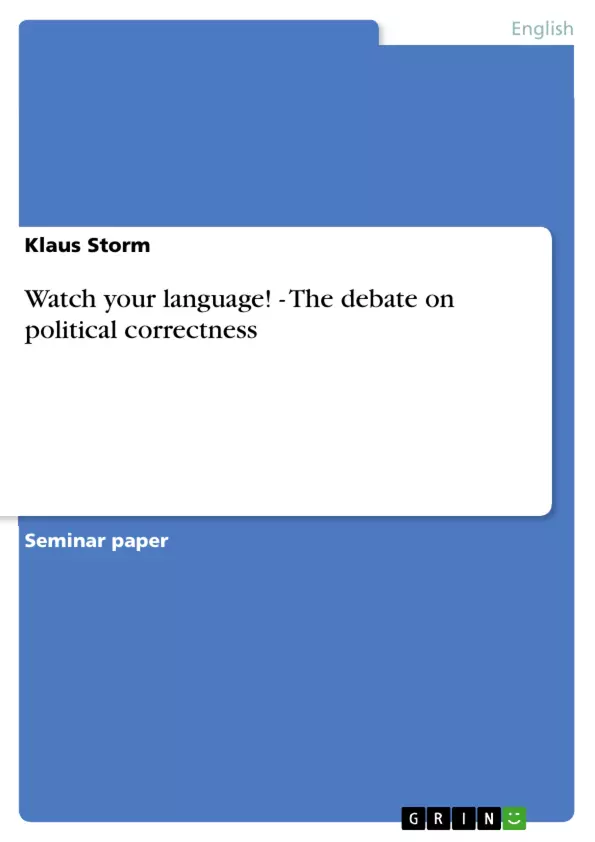Especially in the current German “Nationalstolzdebatte” the term “political correctness” has it’s comeback in the 21st century. Laurenz Meyer is proud of his country. But: are you still allowed to be a German patriot (after the holocaust of the 3rd Reich took place here)? Is this pc?
His opponent in this debate is the minister for environmental issues, Juergen Trittin. He called his antagonist a “Skinhead”. Can you compare a politician with a neo-nazi that lays violent hand on somebody? Is this pc?
Generally: The question “pc or not pc” appears whenever a taboo is discussed.
But what exactly is political correctness? How did the term emerge? Where are the origins of the pc-myth? What is the history of the pc-debate? This essay will try to give the answers. In the first chapter I will show the roots of the term “political correctness”. The historical development will be shown. The debate about censorship and political dependence of pc is portrayed as well. Later I will focus even more on the linguistic aspects of pc. The prime linguistic questions are described and some expressions are examined. Finally there is a short analysis of the need for speech codes.
Inhaltsverzeichnis (Table of Contents)
- Introduction
- The debate on pc
- What is "political correctness"?
- History of the term "pc"
- Censorship and pc
- Linguistic questions on the pc-debate
- "Not pc!" - "Feminazis” and the “Republican Revolution”
- "Don't you say!\" - speech codes
- Conclusion
Zielsetzung und Themenschwerpunkte (Objectives and Key Themes)
This essay examines the concept of "political correctness" and its role in contemporary debates. It traces the historical development of the term, analyzing its origins within leftist counter-cultural movements and subsequent adoption by conservatives. The essay explores the controversies surrounding censorship and the influence of political agendas on the concept.
- The emergence and evolution of the term "political correctness"
- The role of "political correctness" in contemporary debates
- The relationship between "political correctness" and censorship
- The influence of political agendas on the concept of "political correctness"
- The linguistic aspects of "political correctness" and speech codes
Zusammenfassung der Kapitel (Chapter Summaries)
The introduction delves into the resurgence of the term "political correctness" in contemporary Germany, particularly within the "Nationalstolzdebatte". It sets the stage for the essay by highlighting the conflicting perspectives on patriotism and the boundaries of acceptable discourse. The chapter raises fundamental questions regarding the definition and historical origins of "political correctness".
The second chapter explores the definition and history of "political correctness". It traces the term's emergence in American media during the early 1990s, highlighting its use by conservatives to criticize what they perceived as a leftist agenda on university campuses. This chapter further analyzes the negative connotations associated with "political correctness" and its portrayal as a repressive force.
The third chapter focuses on the linguistic aspects of the "political correctness" debate. It examines specific expressions and their implications, such as the use of terms like "Feminazis" and "Republican Revolution". The chapter also delves into the concept of speech codes, exploring their purpose and potential impact on free speech.
Schlüsselwörter (Keywords)
This essay examines the concept of "political correctness" and its related issues, exploring its historical development, the controversies surrounding censorship, and its linguistic implications. Key terms and concepts include: political correctness, censorship, speech codes, leftist counter-cultural movements, conservative critiques, university campuses, free speech, and the "Nationalstolzdebatte" in Germany.
Frequently Asked Questions
What is the origin of the term "political correctness"?
The term emerged in its modern sense in American media in the early 1990s, initially used by conservatives to critique leftist academic agendas.
How is PC related to the German "Nationalstolzdebatte"?
The essay uses this debate as an example of how PC is invoked when discussing taboos, such as patriotism after the Holocaust.
What are "speech codes"?
Speech codes are sets of rules, often on university campuses, that prohibit language deemed offensive or discriminatory towards certain groups.
Is political correctness considered a form of censorship?
The essay explores this controversy, noting that critics often view PC as a repressive force that limits free speech and ideological diversity.
What linguistic aspects of PC does the essay examine?
It looks at specific expressions and how language is modified to avoid social exclusion or the reinforcement of stereotypes.
Who were the opponents in the political debate mentioned in the abstract?
The abstract mentions a clash between Laurenz Meyer and Jürgen Trittin regarding patriotism and the boundaries of acceptable political language.
- Quote paper
- Mag. Klaus Storm (Author), 2000, Watch your language! - The debate on political correctness, Munich, GRIN Verlag, https://www.grin.com/document/118705



